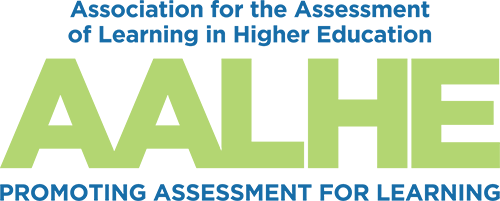- Home
- About AALHE
- Board of Directors
- Committees
- Guiding Documents
- Legal Information
- Organizational Chart
- Our Institutional Partners
- Membership Benefits
- Member Spotlight
- Contact Us
- Member Home
- Symposium
- Annual Conference
- Resources
- Publications
- Donate
EMERGING DIALOGUES IN ASSESSMENTImproving Diverse Learners’ Experiences in First Year Writing October 27, 2023 Angela Mitchell, PhD, University of North Carolina Charlotte, Writing, Rhetoric & Digital Studies The discipline of Writing Studies has worked over the last 15 years to improve evaluation and assessment of underrepresented minorities in writing classes by providing curricular and pedagogical approaches for implementing antiracist practices, such as labor grading, for students (e.g. Condon & Young, 2016; Inoue, 2015; 2019). This study looked to impact how First Year Writing (FYW) Courses at UNC Charlotte (UNCC) can best reach diverse students. Institutional data indicated that underrepresented minorities received Ds and Fs at a higher rate than other students in FYW. In these gateway writing courses, my goal was to find ways to increase overall retention and eliminate achievement gaps from the first-to second year for underrepresented minorities. Moreover, the Black Lives Matters movement, and the uneven effects of COVID-19 on BIPOC communities, as well as UNCC's goals and efforts toward equity, justice, and inclusion demanded a new approach to the teaching of writing that was more conscious about how race and ethnicity may impact student learning. The goal of my project was to analyze writing assignments in FYW to create equitable and accessible assessments for all races/ethnicities. Specifically, I wanted to revise my assessment practices to emphasize reflection and encourage low stakes writing and labor grading and to assess the impact of these assignments on different races/ethnicities. More broadly, I sought knowledge on how and why different races/ethnicities struggle or succeed in our program’s writing assignments. From 2019-2021, I actively applied labor grading, which awards points for effort, in my first year writing classes, heavily emphasizing out of class “homework” on assignments. In summer 2021, I participated in assessment workshops and learned that my move to 50% “engagement” or labor grading had not helped all students: the collected data showed the engagement grades helped students who already knew “how to student” and was based on a normative conception of time and labor. In reality, many of my students were first generation and were working or had family responsibilities that made the daily homework, a key part of the engagement grade, especially difficult. As I planned changes to my late summer 2021 class, I endeavored to develop a clear linguistic justice framework following Inoue (2015; 2019), Young and Condon’s (2016) work in the field. as well as clear explanations for the utility value in the assignments. Reflection was already a key learning goal for the course, but as part of my assessment project, I added daily reflections to our in-class writing. I had always thought I let students know how the homework was scaffolded to help them work on their portfolio projects, but I doubled down on my efforts. I increased my conversations about scaffolding and started to provide feedback on daily assignments. The outcome gaps we had discovered showed that UNC Charlotte students did poorly on homework and low stakes writing, which aligned with what I was seeing in my own classes. Consequently, I continued to grade homework holistically, not using a specific point scale but awarding points for work done outside class as much as possible. The student feedback from this short summer session indicated that they viewed the daily coursework differently: some found the homework helpful, and others found it overwhelming. The difference in student experience was troubling to me. For Fall 2021, I decided to award a point scale to the homework assignments in an effort to provide more specific feedback on daily assignments, as suggested by one of our assessment workshop facilitators. Unfortunately, I did not realize how it would lower midterm grades in Canvas. This change caused more confusion and frustration regarding the homework grades. I regretted moving from participatory grading (complete/incomplete). Additionally, even with my increased conversations about scaffolding, some students still struggled to see the value in homework. I also encountered some students who were noticeably (in class and in evaluations) uncomfortable with the linguistic justice assignments I had added to the class. Supporting data from my fall class revealed that although 23% of all FYW students self-identified as an under-represented minority, 25% of all unsuccessful students (those earning D, F, or W) were from underrepresented minorities. I lost students to forces beyond the academic: personal struggles, family illness, and difficulties balancing work and academic life. These students were overwhelmed, and many seemed to find in-person attendance hard after so much time spent online in the preceding year and a half. Most of the students earning Ds and Fs had stopped attending by midterm, even after my repeated efforts to work with them to stay in the class. What I began to see was that much of my class was based on ableist frameworks that no longer workedin the pandemic landscape. As I moved forward for Spring 2022 planning, I made a number of changes. First, I embraced “crip time” or non-normative conceptions of labor and time (Carrillo, 2021; Wood, 2017). This approach decreased my homework engagement grades. Second, I re-evaluated the Extended Inquiry Project, which I realized took up too much of the semester and kept students who don’t get off on the right foot early, behind. Instead, I assigned 3-4 smaller inquiry projects. Third, I added attendance and participation points, which I had not done in a long time. In addition, I changed the points awarded for engagement work to mid-semester and final calculations. I focused on slowing down and on having students do less perceived busy work, and I gave them the option of designing their own homework activities to help them work on larger projects. Students were more engaged when they could decide the homework needed for their project.
This process has deepened my awareness of the intersectionality of our students’ lives (this is really a story about how class impacts labor grading approaches). What has surprised me the most was how this institutional work has made me complicate trending frameworks on labor grading from the discipline of Writing Studies. If labor grading (where the teacher determines the amount of effort required for a certain grade) is seen as the only way to address linguistic justice by writing teachers, they are missing the intersections of race and class that impact a student's labor. Providing agency in determining labor is a key factor for improving labor evaluation in writing classes. Although creating agency in study assignments works well in the discipline of Writing Studies due to the small class sizes, it is possible for larger classes in other disciplines to use some of these strategies to better address workload and engagement issues for students in the twenty-first century classroom.
References Carillo, E. (2021). The Hidden Inequities in Labor-based Contract Grading. University Press of Colorado. Condon F. & Young, V. A, (2016). Performing Antiracist Pedagogy. The WAC Clearinghouse University Press of Colorado. Inoue, A. B. (2019). Grading Contract for First Year Writing. Labor-Based Grading Contracts Building Equity and Inclusion in the Compassionate Writing Classroom, WA Clearinghouse, 329-345. |



